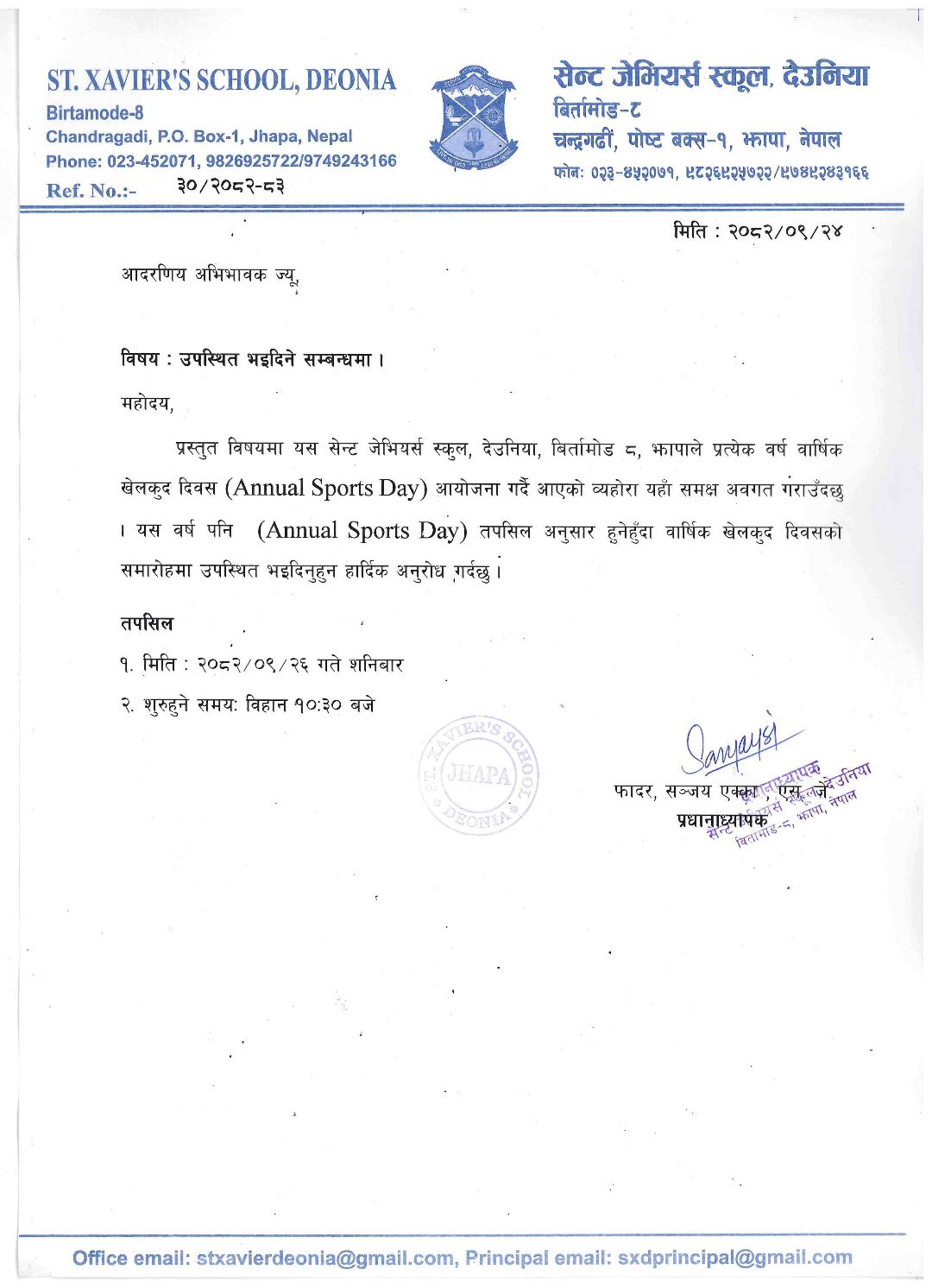Jesuit Eduction
ABOUT JESUIT EDUCATION
St. Xavier’s Today
St. Xavier’s School is an English-medium School under the management of the Nepal Jesuit Society, which is the Nepal branch of the Society of Jesus, an international Catholic (Christian) religious order.
The Society of Jesus, popularly known as the Jesuits, was founded by St. Ignatius of Loyola in 1540 and has been active in the field of education throughout the world since its origin. This School was started in 1999 by the Jesuit Fathers.
It is one of several schools throughout South Asia and the world that are organised and run by the Jesuits. We aim to cultivate in our students a sound mind in a strong body. The motto of our school is “Live for God, Lead for Nepal”. Worldwide, the Jesuits are now responsible for:
231 Higher Education Institution
(Universities, University residences, colleges and Philosophy/Theology Colleges)
462 Secondary School (Secondary schools and Technical/Professional Schools)
187 Primary School
70 Professional Schools;
61536 Other Institutions.
JESUIT SERVICE IN NEPAL
- Educational Field
St. Xavier’s School, Godavari
St. Xavier’s School, Jawalakhel, Lalitpur
St. Xavier’s College, Maitighar
St. Xavier’s School, Deonia, Jhapa
St. Xavier’s School, Sadakbari
St. Xavier’s School, Zero Mile, Madhesh Pradesh Shishu Bikash Kendra, Pokhara
Moran Memorial School, Maheshpur, Jhapa
Human Resources Dev. Res. Centre, Sanepa - Social Field
St. Xavier’s Social Service Center’s Lalitpur
St. Xavier’s Mission, Tipling, Dhading
Nepal Jesuit Social Institute, Jawlakhel, Lalitpur - Pastoral
St. Anne’s Parish, Pokhara
St. Xavier’s Parish, Jhapa
St. Ignatius, Baniyatar, Kathmandu
Good Shepherd Church, Tipling
Godavari Ashram Spiritual Centre, Godavari
OBJECTIVES OF JESUIT EDUCATION
Jesuit education is inspired by the vision of people drawn from the life and teachings of Jesus Christ, who has always been respected and admired for more than 2000 years. It is also based on the principles of character formation elaborated by the founder of the Society of Jesus, St. Ignatius of Loyola. This vision and these principles give Jesuit educational institutions a specific character and set before their staff, students, and parents a high ideal of humanism and service towards which they are continually invited to strive.
Our objective is to promote the total development of the person so as to be truly human and truly Nepali. This means the students be open and committed to both the Divine Spirit and human beings, by being actively concerned about national development and the well-being of all.
A. SOCIAL AND ENVIRONMENTAL:
To produce “people for others”
- Admit students from all backgrounds.
- Recruit and train staff members who can work within our vision.
- Encourage students to learn to serve.
- Teach justice issues in all courses.
- Encourage students to dream about making a difference in society.
- Challenge prejudices.
- Appreciate diversity and differences.
- Understand issues concerning gender, human rights, communalism and ecology.
- Cultivate cooperation.
- Education for environmental responsibility and caring for our Common Home.
B. SPIRITUAL:
To produce people who are both liberal and responsible.
- Develop religious convictions while respecting others’ positions.
- Free students from social conditioning so that they can make their choices freely.
- Nurture a culture rooted in compassion & forgiveness. Encourage formation in each student’s beliefs.
- Teach students to look for the better way (God’s way) when making decisions.
- Teach about other religions while encouraging Students to be rooted in their own religion.
- Teach honesty
- Develop the spirit of MAGIS.
C. INTELLECTUAL:
Sound formation based on Ignatian Pedagogical Paradigm (IPP), developing the students’ imaginative, affective and creative dimensions. (Context, Experience, Reflection, Action)
- Develop creative activities.
- Teach students to think reflectively, logically and critically.
- Foster cooperative learning.
- Encourage personal research.
- Encourage the expression of ideas and opinions, and
- listening to others’ views.
- Teach students to critique the mass media.
- Teach students to handle stress well.
D. PERSONAL:
All-round development of the student.
- Develop a positive self-image in the student.
- Participate in co-curricular activities.
- Encourage sports with a spirit of cooperation.
- Encourage students to develop their personal skills.
- Provide personal growth exercises: PDW, value Education, clubs, scouts and other activities.
- Provide opportunities to make decisions.
- Encourage student interaction, especially with Students from other schools.



